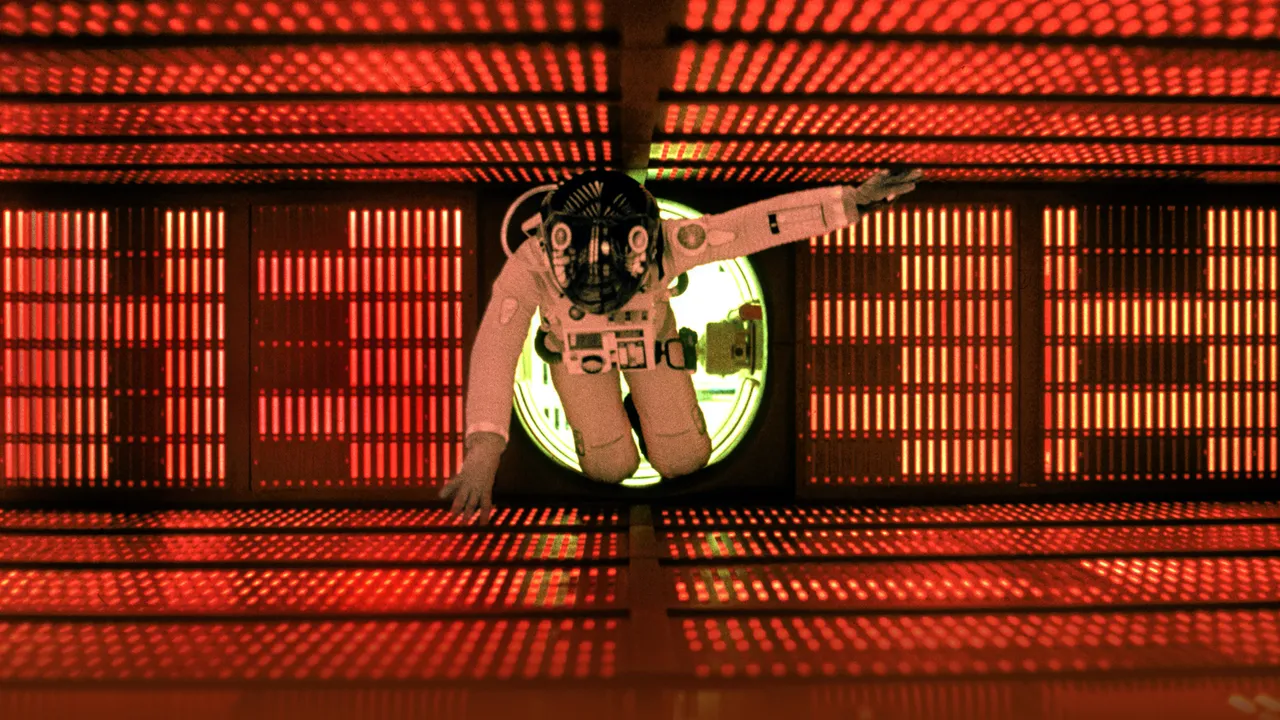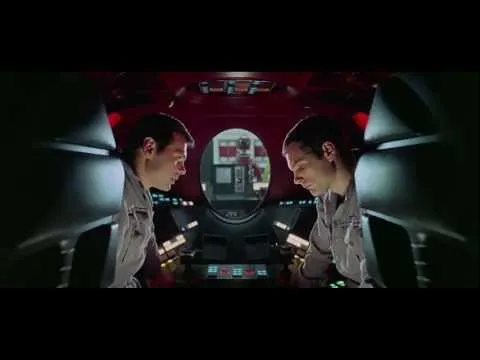
Few days ago people of the world had some opportunity to rest from the usual depressive news about coups, wars, disasters and presidential adulteries because world media finally turned their attention to more serene and heavenly subjects. One of those subjects is U.S. space shuttle "Endeavour" and its mission with the aim of connecting space modules - building blocks of the International Space Station. This news story invigorated many Space Age enthusiasts, but also filled their hearts with sadness. Their beloved Space Station, even when becomes finally built and fully operational in few years, would be far from fulfilling their dreams. Most of those dreams were inspired by a future envisioned in 2001: A Space Odyssey by Stanley Kubrick, the most influential and unique work ever made in the history of seventh art.
In the small world of cult cinema, 2001 is somewhat shadowed by other cinematic giants which are either more popular or pleasing to the audience, either general or cult, or simply more "earthly" to the mainstream critics and film scholar who dictate what should be artistic summit or not. Another thing that makes 2001 overlooked is the fact that its time might be somewhat pass‚. Thirty years ago, space exploration was a novelty able to catch people's imagination and inspire idealistic visions of the bright future for entire mankind. These days, almost nobody pays attention to space shuttles and satellites unless they crash, and materialistic considerations impede any ambitious plans for the human presence in space. To the casual observer, 2001 might really be discarded as the relic of age long gone, product of the idealistic and naIve minds, something that can't be understood by today's cynical and nihilistic viewers, especially those of Generation X.
Misunderstanding, however, isn't new problem for 2001. Even during its premiere the movie was generally misunderstood - critics panned it, because they didn't understand it, and audience, inspired by contemporary psychedelic trend loved it for the entirely wrong reasons. Even one of the movie authors - screenwriter and famous science fiction novelist Arthur C. Clarke - admitted that even he couldn't know what the movie was all about. In the next thirty years countless articles, essays, books, documentaries and scientific studies would be written with the sole intent of trying to answer those questions; despite their best efforts, the audience would still remained confused as during the premiere. However, the deliberate leaving of unanswered questions benefited the movie and helped it to survive as cult favourite for three decades. Mostly because 2001, unlike most of other movies, has a unique ability to affect its audience - whether they like the movie or not, or whether they understand it or not, they can feel they are experiencing something grand and magnificent, even if they can't find the proper words to describe it or explain it.
The only thing that can be explained more or less coherently is plot. The movie begins with the prologue set roughly 4,000,000 years ago in East Africa. Small band of prehistoric ape-men, including Moonwatcher (played by Daniel Richter) lives a poor, short and brutal life, plagued by famine and under constant danger of predators. One day Moonwatcher discovers big, black shining monolith. The artifact of supposedly alien intelligence inspires Moonwatcher to use intelligence of his own - he discovers the bone as weapon, which leads to boars as a new source of food for his tribe. After + defeating the rival tribe in a war for water, Moonwatcher symbolically throws the bone in the air. In the next shot - often regarded as the most spectacular transition in the history of cinema - bone transforms in the space satellite that roams the Earth's orbit 4,000,000 years later. It is only one of the objects in Earth's orbit, full of different spaceships, including one that carries Doctor Heywood Floyd (played by William Sylvester), American space bureaucrat, to the Moon. Floyd is set to oversee the investigation of monolith found on the Moon's surface. The monolith emits signals to Jupiter, and 18 months later, US space ship Discovery is sent to investigate the fourth planet of our solar system. The spaceship is manned by two astronauts - Frank Pool (played by Gary Lockwood) and Dave Bowman (played by Keir Dullea), but actually controlled by HAL 9000, computer equipped with artificial intelligence (voiced by Douglas Rain). During the voyage, allegedly infallible computer begins to make mistakes, which forces the human crew to think about disconnecting it.
Even those who don't like the lack of clarity in 2001 are forced to admit that, on the technical side, this film really deserves to praised as one of the milestones in the history of cinema. Its director, Stanley Kubrick, made great movies before (Lolita) and after (A Clockwork Orange, filmed three years later, is actually preferred by mainstream critics), but in this film he used all his talent to make something really remarkable. First of all, 10 million US$ budget - something that looked like a fortune and was almost unimaginable for science fiction at the time - was used to create very detailed world of future supertechnology. Along the professional production and costume designers, Kubrick employed the talents of futurologists and real-life scientists and space vehicle designers, which resulted in the high level of plausibility and authenticity for a futuristic movie (the real life instruction for a zero gravity toilet is just the most common example). Another important element were the groundbreaking special effects; Kubrick, together with legendary Douglas Trumbull, introduced many revolutionary techniques that helped the audience to suspend its disbelief and make studio-recreated space, including zero gravity look also authentic. Thanks to those effects,2001 looks as convincing now as it looked for the unsuspecting audience thirty years ago (and despite the fact that we couldn't see such level of technology in real-life 2001). Finally, Kubrick was also revolutionary in using non-original music; his choice was superb and some themes - especially those by Johann Strauss ("An der schoenen blauen Donau") and Richard Strauss ("Also Spracht Zarathustra") - would stay forever associated with his powerful imagery.
The actors of the movie remained mostly forgotten and that shouldn't surprise anyone, because this is the movie of the sights, sounds and ideas and not of the great memorable characters. Most of those characters are either hidden behind ape-like costumes (Moonwatcher), or presented like boring bureaucrats (Floyd) or astronauts turned emotionally numb by the boredom of their job (Pool, Bowman). Ironically, it is the non human character, HAL, that brings real human dimension to the events of the movie by expressing genuine emotions. Furthermore, there are relatively few words spoken in the entire movie - and most of the lines are trivial and serve only to illustrate banality and boredom of the life in the Space Age. The only lines that entered movie lovers' collective memory are the HAL's famous last words.
2001 is a movie as close to perfection as one movie can be. Those who deny it such status are probably those who question its plausibility. We are less than three (one, if you consider the 1999 segment) years away from the world presented in the movie, and most of the movie looks dated or overoptimistic now. Our space technology seems decades, if not centuries behind those presented in Kubrick's vision. Our fashions and social customs changed drastically compared with the late 1960s; the Cold War, that provided material for one of the more banal conversations in the movie, is thing of the past. Our computers didn't develop artificial intelligence. But are all those false predictions reasons enough for us to downgrade 2001? Is the Orwellian vision moot because the world in 1984 lacked Big Brother? Should we discard Blade Runner when November 2019 comes without replicants in sight? The answer should be no. The movie was authentic by 1968 standards, and it was very plausible, taking into consideration contemporary trends. 2001 is a movie that presents future that probably won't happen, but also the future that might have happened. Even as false vision, 2001 remains powerful one, able to inspire us to ask questions about our existence, our true nature as human beings and, finally, our future.
RATING: 10/10
(Note: The text in its original form was posted in Usenet newsgroup rec.arts.movies.reviews on December 9th 1998)
==
Blog in Croatian https://draxblog.com
Blog in English https://draxreview.wordpress.com/
Cent profile https://beta.cent.co/@drax
Minds profile https://www.minds.com/drax_rp_nc
Brave browser: https://brave.com/dra011
BTC donations: 1EWxiMiP6iiG9rger3NuUSd6HByaxQWafG
ETH donations: 0xB305F144323b99e6f8b1d66f5D7DE78B498C32A7

